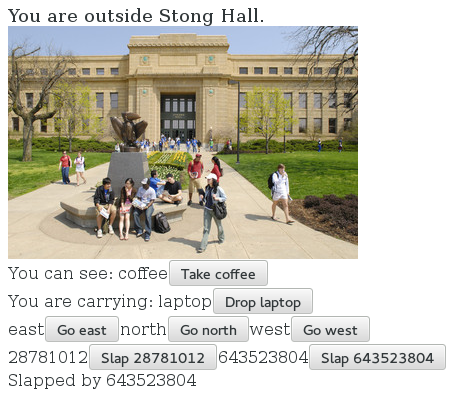For our first team project in EECS 581, we were given a Node.js web app, which worked as an adventure game set on KU’s campus. The point of the game was simple: find the basketball, take it to Allen Fieldhouse, you win.

Three members of our group — Alex, Nick, and I — worked on this particular version, which is available at ianweller/lab2.
The goal of this project was to make some improvements to the game. Specifically, we needed to add:
- non-interference (kind of), so one user doesn’t somehow ruin the game for everyone else;
- interactivity, so the user could interact with other players in the game; and
- persistence, so the user could refresh and remain in the same state.
Real-time updates
Before we did any of the above, we wanted to make sure that there was as little delay as possible between a user changing the world and another user seeing those changes. So we used WebSockets, which is one of the more recent developments in the real-time web.
The original code was written in Express; I knew off-hand that Socket.IO was a quick and hacky way to get started with WebSockets, and it turns out that Express.io is a drop-in replacement Express, but with the added APIs of Socket.IO.
So instead of polling every two seconds or so for updates, we wait for
events to go across the socket — a world-changed event calls the
same refresh function that was in the original code.
Non-interference
In the original code, there was no concept of separate users playing the same game at once. If another client connected, they could pick up items into their inventory — which was shared with every other client, so everybody picked up the same item. Instead of keeping track of one inventory, we kept track of separate users, who each had their own inventories.
We made the decision that there should only be one of each object in the world, mostly because we did not want to invent a replicator. So the inventory of each “room” remains a global variable, not a user variable.
Interactivity
Users in the same world ought to be able to interact with each other. We couldn’t think of anything actually fun to do, so we implemented buttons that let you slap other players, which simply printed a message on their screen saying they were slapped.
Be careful! You can slap yourself and there is no way to know which user ID is yours.

The goal was to make it so slapping dropped all your items, but that was two weeks ago and I’m pretty sure our entire team forgot.
Persistence
What happens when the server crashes? It sure would be nice to keep track of what was going on in your extremely complicated adventure.
We adjusted the code so that when a world-changing event occurs, a summary of that change is printed to a file, which is then read on server startup. It’s not as robust as a database, but it certainly gets the job done.
What we learned
- We learned about HTTP and creating RESTful APIs with the GET, POST, PUT, and DELETE methods in Express.
- We learned about implementing WebSockets with Socket.IO on both the server and client.
- We learned about how JSON documents are created (and how simple they really are).
- For those of us who haven’t used JavaScript very much, we gained some experience programming with it.
- None of us had ever used Node so that was a learning experience.
- In general we learned a little about the process of writing web apps.